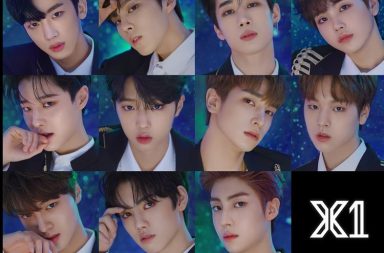Last Friday marked an important day for I.O.I and I.O.I fans alike. At the 2016 MAMAs the group finally received the rookie award that they had all been dreaming for. This moment was a bittersweet one. On one hand, it is a testament to the success the group has had with their debut and their busy one year of promotions; on the other, it also marks the drawing to a close – albeit a beautiful one – of their promotions as I.O.I.
Having been formed through a highly competitive and greatly publicised process, the final members are not only the the best of the best, each individual also has a sizable fanbase and the group has immense public recognition — which is something that even senior groups struggle to achieve. As a result, the group has shown a stellar performance right from their debut. I.O.I’s first two variety show appearances, JTBC’s Sugarman and tvN’s SNL Korea, broke records in terms of ratings. They scored a number of CFs upon debut, seven of which ones were secured even before the final lineup was announced. They even managed to keep their debut song, “Dream Girls,” quite high up on music charts, despite not many seeming to have liked it much.
In the months following their debut, seven of their members returned as a unit with “Whatta Man,” which provided a change of image, and was much better received. The single eventually earned the group their first ever win and first public show win on The Show and Music Bank respectively. The remaining four members didn’t have to feel bad though, because when the group made comeback with “Very Very Very,” they shared an emotional win on Show Champion as a whole (as well as an unbroadcasted one on Inkigayo), and the song itself actually topped charts for a bit.
The disbandment of I.O.I has thus been understandably labelled by many as unfortunate; had they been a permanent group, they would’ve had the potential to grow and prosper into one of the strongest and most well rounded girl groups in the K-pop scene. However, all good things must come to an end, which raises questions about what things will be like going from here.
 Interestingly enough, the members of I.O.I have achieved varying degrees of success when promoting on their own in their respective companies. MBK Entertainment almost immediately gave DIA a comeback as soon as one of its members, Chaeyeon, made the final cut, in what was clearly an attempt to strike while the iron was hot and raise the group’s public recognition. However, the comeback, while doing better than DIA’s previous endeavors, wasn’t met with much notable success.
Interestingly enough, the members of I.O.I have achieved varying degrees of success when promoting on their own in their respective companies. MBK Entertainment almost immediately gave DIA a comeback as soon as one of its members, Chaeyeon, made the final cut, in what was clearly an attempt to strike while the iron was hot and raise the group’s public recognition. However, the comeback, while doing better than DIA’s previous endeavors, wasn’t met with much notable success.
Jellyfish Entertainment was next to debut I.O.I members Sejeong and Mina in their newest girl group Gugudan, but that group also quickly disappeared under the radar. On the other hand, despite Yeonjung’s very obviously last-minute addition to WJSN (given the 12-membered concept of the group was lost), the Starship girl group actually saw a significant rise in popularity, partially attributable to Yeonjung but also partially to fellow member Cheng Xiao. Sejeong also very recently made a solo debut as a project that originated on her TV show Talents for Sale, which was incredibly well received – not only did it hit number #1 on music charts, she also won on music shows with just the digital single.
The successes and failures of the individual endeavors of I.O.I members all lead to at least one conclusion – having the I.O.I/Produce 101 brand name does not guarantee immediate success. This has two main implications on the members moving forwards from here. Firstly, companies cannot rely on the I.O.I members’ fame to make their own groups popular. DIA and WJSN are almost perfectly contrasting cases in that sense. When MBK pushed Chaeyeon hard in “On the Road” — to the point where they were almost consciously making the group “Chaeyeon and her backup dancers” — it had little effect on the group’s performance, minus the fact that they got more publicity.
On the other hand, while Yeonjung gave WJSN a boost with her addition to the group, it was the combined effect of Yeonjung’s popularity alongside the discovery of Cheng Xiao that propelled the group’s recognition forward significantly; showing that groups need more than the attention surrounding a single member to achieve success. Likewise, I’m happy to see that DIA’s subsequent comeback, “Mr. Potter,” had a more equal screentime distribution, and MBK is also giving other members some opportunity, even if they are often presented in the form of 1+1 deals.
 The second implication is that, companies still need to pick the right concepts for the I.O.I members to shine. When Gugudan debuted, many commented that while Sejeong was one of the aces of Produce 101 – don’t forget she came in 2nd place in the show overall – she barely stood out when her new group debuted with “Wonderland.”
The second implication is that, companies still need to pick the right concepts for the I.O.I members to shine. When Gugudan debuted, many commented that while Sejeong was one of the aces of Produce 101 – don’t forget she came in 2nd place in the show overall – she barely stood out when her new group debuted with “Wonderland.”
Granted, the song wasn’t great, which probably wasn’t a good first step for the group in terms of cementing a position in the K-pop scene; but, if Jellyfish was hoping for Sejeong and Mina to hard carry, giving them a concept that wasn’t their forte wasn’t the wisest decision. This can be shown by the solo debut of Sejeong: when given a mature and pretty concept with a ballad that brought out her vocal colour, her potential was so much better utilised.
As for the yet un-debuted members, it’s hard to predict how successful they will be moving forwards from here. My guess is that Pledis Girlz has the most potential, because the company is really playing their cards right in terms of promoting the group. They already have a track out, have performed at events as a group, and have had gotten non-I.O.I members, namely Shannon, on broadcast through Girl Spirit, which helps share the attention between the members. More importantly, the trainees also seem very talented, and with good visuals to boot.
I also have my eye on the Fantagio girls, because the teamwork of the trainees impressed me on the first episode of Produce 101. As for the I.O.I member I am most worried about, it would be undoubtedly Chungha. Her company, M&H, is very obscure, and without the proper support of a good company, it’s hard for debuts to make an impact, or even be known about at all. Did you know that Hwang In-sun of Produce 101 released a song? How about Park Hae-young, who debuted in A.De? It’s easy for newly debuted acts even with a head start given the Produce 101 fame to fall into nugudom without the power of at least a mid-tier agency, which is an unfortunate waste of potential. It is also uncertain whether Chungha would be in a group or debut solo. In my opinion, her talents would certainly be better utilised as the latter.
 Last but not least, a second season of Produce 101 is slated for airing next year, with male trainees. This draws a bit of curiosity in regards to whether it will live up to the hype of the original. When the idea was announced shortly after the finale of the first season, speculations weren’t very optimistic. Unlike the girls version, which would draw in male and female viewership alike, they argued a boys version would only catch the attention of female viewers.
Last but not least, a second season of Produce 101 is slated for airing next year, with male trainees. This draws a bit of curiosity in regards to whether it will live up to the hype of the original. When the idea was announced shortly after the finale of the first season, speculations weren’t very optimistic. Unlike the girls version, which would draw in male and female viewership alike, they argued a boys version would only catch the attention of female viewers.
However, I will give it the benefit of the doubt. After all, no one knew the first season would be the hit that it was either. In the end, its success lies in three main factors: the trainees and how well the editing is able to bring out their appeal, the songs/performances and whether they’re a hit among the general public, and the ability for the show to compel viewers to participate in voting.
All in all, here’s wishing I.O.I all the best in the final group activities before their disbandment on January 31, the members the best of luck in the future endeavors!
Readers, how do you think the I.O.I members will do going forwards from here? Are you looking forward to the next season of Produce 101? Let us know below!
(YouTube. Images via Mnet, SBS, Jellyfish Entertainment, MBK Entertainment, Pledis Entertainment)


